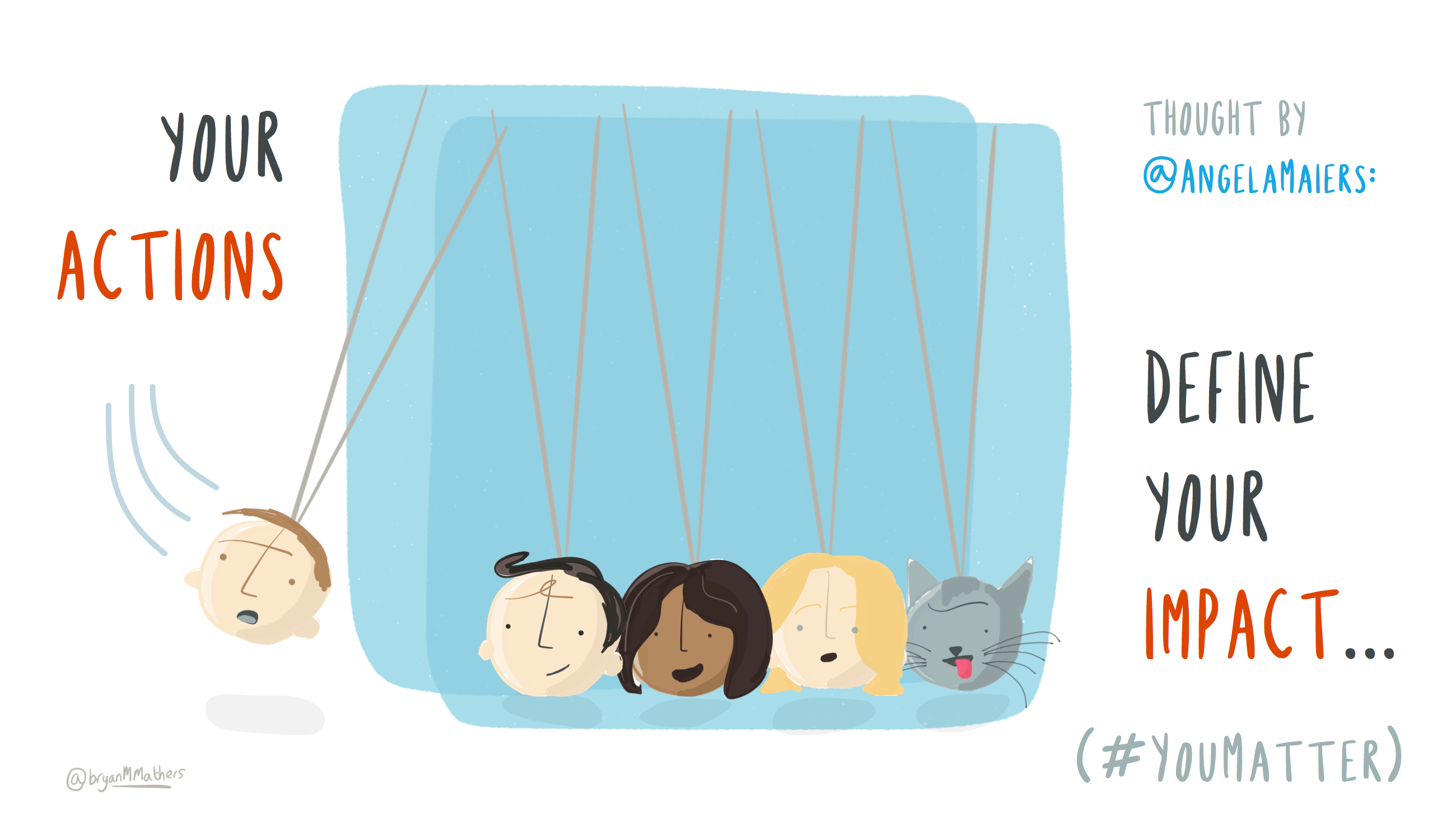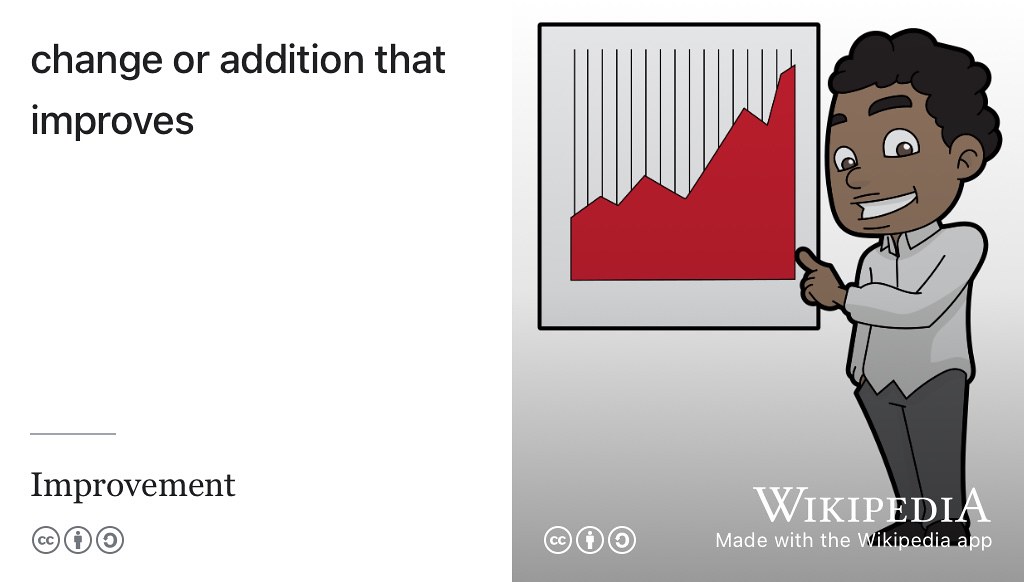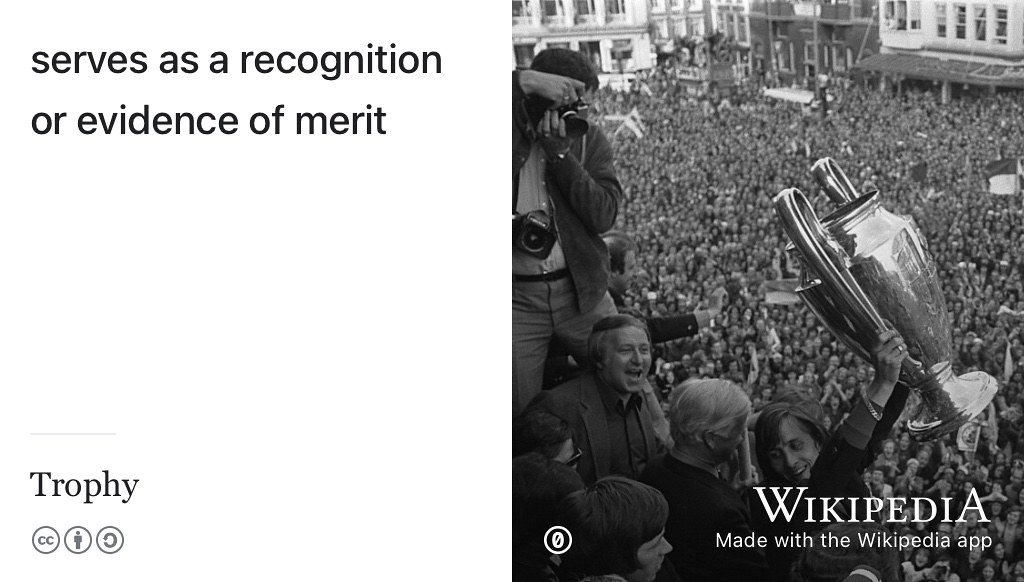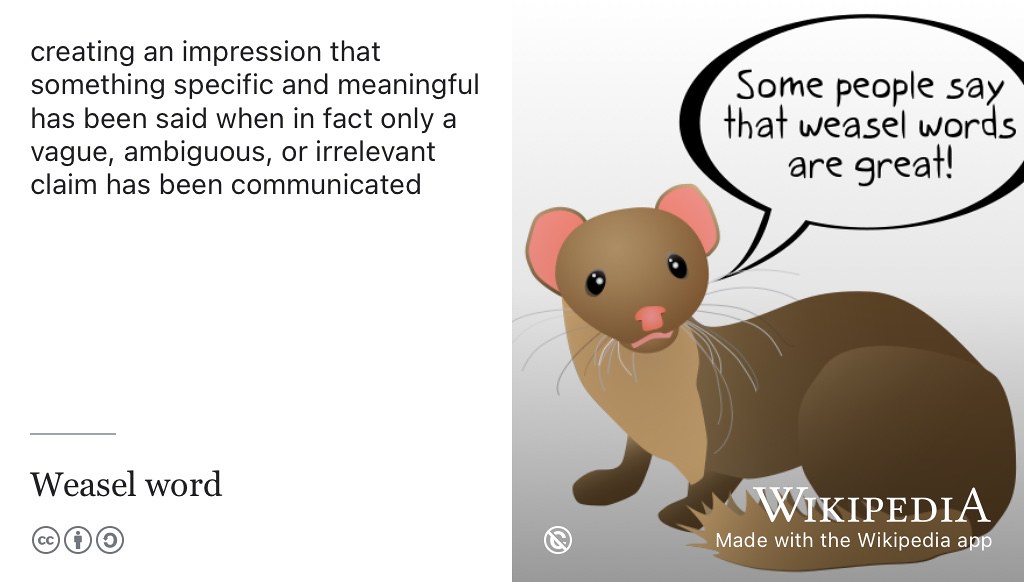10 Verbalising Your Future
Employers are often more interested in what you have done, rather than what you just know. Your actions are a key part of your story we discussed in section 8.7.8. A simple technique for emphasising the action in your stories is to lead descriptions of your PROJECTS, EDUCATION and EXPERIENCE with carefully chosen verbs, see section 8.8.6 for examples.
10.1 Your actions define your impact
Your actions define your impact, see figure 10.1. What stories can you tell of your actions to date? What verbs best describe how you achieved a result or had an impact? What was the context, action, result and evidence (CARE) we discussed in section 8.7.8 of each (short) story?

Figure 10.1: What action have you taken and what stories can you tell about the results and your impact? What are the best verbs for highlighting your actions? Your actions define your impact by Visual Thinkery is licensed under CC-BY-ND via Angela Maiers
By leading with verbs you will highlight what you have actually done and how you did it, rather than what you know. It also helps you cut down on repetitive personal pronouns: I, me, my etc. See the verbs first section 8.8.6 of chapter 8 debugging your future.
Your future is bright, your future needs verbalising, so let’s start verbalising your future.
10.2 What you will learn
By the end of this chapter you will be able to:
- Emphasise your actions when describing your education, projects and experience on your CV
- Reflect on
- what skills you already have
- what skills you need to develop
- Demonstrate those skills explicitly and quickly in job applications
10.3 Breakpoints
Let’s pause here. Insert a breakpoint in your code and slowly step through it so we can examine the current values of your variables and parameters.
Quickly scan your CV, covering letter or application form for VERBS:
- Where are the verbs?
- buried deep in long sections of prose? OR
- prominently leading descriptions of your activities?
- Have you over-used certain verbs (like
workedorassistedfor example) or been repetitive (like over-usingdevelopedsee alternatives in section 10.5) - How can you increase the variety of verbs you have used (without exaggerating or lying)?
- Which verbs are stronger than others and why?
- Are there any categories of verbs you can’t provide evidence for, such as leadership (see section 10.6) or influencing (see section 10.11)?
- What activities or projects could you do that would help you develop these missing skills?
We’ve classified the verbs you might use on your CV into sets below:
- 👩👩👧👦 Team verbs: section 10.4
- 🛠 Engineering verbs: section 10.5
- 💡 Leadership verbs: section 10.6
- 📈 Improving verbs: section 10.7
- 🧪 Scientific verbs: section 10.8
- 🏆 Winning verbs: section 10.9
- 📆 Organising verbs: section 10.10
- 💪 Influencing verbs: section 10.11
- 🐹 Weasel verbs: section 10.12
- 💩 Bullshit verbs: section 10.13
- 🤖 AI verbs: section 10.14
- 😶 Missing verbs: section 10.15
10.4 Team verbs
Some verbs to demonstrate how you have worked and communicated with others in a team, see figure 10.2

Figure 10.2: What kinds of teams have you been a part of? What role did you play in the team? How did your teamwork make the dream work? Employers will want to know the details, so spell it out for them explicitly using carefully chosen verbs to describe the different roles and responsibilities you’ve taken while working towards common goals. CC BY picture of a team pushing a vehicle out the mud by Clear Path International on Wikimedia Commons w.wiki/9f4Y adapted using the Wikipedia App 👩👩👧👦
administeredadvised-
advocatedif you campaigned or lobbied for something to happen assisted-
attended…but show outcomes briefedcoachedcollaboratedcommunicated-
consultedeither as giver or receiver -
convenedyou made a group come together contributeddelegateddiscussedencouragedexplained-
instructed(if you helped others) interviewedorganisedperformedpresentedrecommended-
recruitedyou persuaded people to join you -
servede.g. customer service or serving a community -
shadowede.g. work shadowing suggestedvolunteered
10.5 Engineering verbs
There’s no shortage of verbs to describe your engineering skills, see figure 10.3.

Figure 10.3: What verbs can you use to describe your application of science and mathematics in order to engineer software and hardware? CC BY-SA Beam engine picture by Nicolás Pérez on Wikimedia Commons w.wiki/9g4y adapted using the Wikipedia app 🛠
Verbs you could use to demonstrate your engineering skills:
-
adaptede.g. new features -
addede.g. new features -
analysede.g. the requirements -
appliede.g. the appliance of science architected-
assignede.g. bugs to team members -
automatede.g. builds and tests etc built-
branchede.g. git configured-
designede.g. greenfield software development -
clonede.g. git -
debuggedmost software engineering is debugging your own, and other people’s code developeddeployeddocumentedengineered-
exploitednot a person but a feature -
fixede.g. bugs -
gatherede.g. requirements -
implementede.g. your favourite algorithm installed-
integratede.g. different systems made-
mergede.g. git migratedmodified-
optmisedyou improved the performance of something refactoredsolvedspecifiedupgradedtested
10.6 Leadership verbs
How can you convince your reader you are actively developing your leadership skills? Are you a manipulative Machiavellian ruler or are you capable of a more empathetic and inclusive approach, see figure 10.4?

Figure 10.4: What kind of leader do you want to be? Do you want to be loved or feared? Neither or both? The diplomat Niccolò Machiavelli argued that it is best to be feared if you can’t be loved. Thankfully many other kinds of leadership are available, with a wide range of verbs to describe them: mentored, motivated, demonstrated, facilitated, and supervised etc. Public domain image of a portrait of Niccolò Machiavelli by Santi di Tito on Wikimedia Commons w.wiki/5FCv and adapted using the Wikipedia app 💡
Verbs you could use to demonstrate your leadership:
-
acceleratednot just hardware acceleration but people too! -
arguede.g. persuasive reasoning, either spoken or written -
deputisedbecause sometimes you have follow, you can’t always be a leader demonstratedenabledestablishedcreated-
decidedyou’ve had the power to make (or influence) decision making deviseddirected-
influencedsee section 10.11 facilitated-
foundedorco-foundedyou started something from scratch guidedhostedinitiatedintroducedinventedlaunchedledmanaged-
mentoredif you’ve helped develop others by sharing your skills and knowledge motivatedsupervised-
transformedyou changed something for the better
10.7 Improving verbs
Have you improved something by changing or adding something, see figure 10.5? That something could be a service, a product, a process or even people, including yourself.

Figure 10.5: Quantifying any improvements you have made will convince your reader that you’ve made something better in a measureable way. CC BY-SA image of cartoon guy by Free Clip Art on Wikimedia Commons w.wiki/9g5z adapted using the Wikipedia app 📈
Verbs that demonstrate how you have improved a situation by taking responsibility for something:
delivered-
completedif you finished something editedenhancedgenerated-
increasedmake sure you quantify it, see section 8.7.8 -
learneddescribe what you have learned refined-
resolveda conflict or conflicts -
savedmoney, time, resources etc -
validatedyou proved something
10.8 Scientific verbs
We’re all scientists deep down and we all use scientific skills and knowledge in our daily life, see figure 10.6.

Figure 10.6: Computer Science isn’t a natural science, but that doesn’t mean it isn’t natural to have some verbs to demonstrate your scientific skills. CC BY-SA image of the Carina Nebula by T. Preibisch and the European Southern Observatory (ESO) on Wikimedia Commons w.wiki/9cVA adapted using the Wikipedia app 🧪
Some verbs you could use to describe your scientific skills and knowledge include:
assessedcalculateddiscoveredestimatedevaluatedexperimentedidentifiedinterpretedinvestigatedmeasured-
modelledin a computational or mathematical sense observedpredictedproved-
quantifiedfor example in benchmarking -
researched
reviewedsimulated-
studiedwe are all students at the School of Hard Knocks tested
10.9 Winning verbs
Have you won any prizes, trophies or other awards? You should display them with pride and tell your reader what they were given for, see section 8.7.6 and figure 10.7

Figure 10.7: There’s plenty of verbs for describing awards and honours you’ve been granted, not just trophies like this one, but any kind of award you’ve gained or been given to recognise your achievements, even the smaller ones like those described in section 24.4. CC0 public domain picture of Johan Cruyff holding the European Champion Clubs’ Cup in 1972 from the Nationaal Archief on Wikimedia Commons w.wiki/6h5t adapted using the Wikipedia App 🏆
Verbs for demonstrating your achievements, progression and honours:
achievedattainedawardedgainednominatedrecommended-
selectedyou were chosen for something masteredwon
10.10 Organising verbs
Have you ever organised something? Organisation makes everything else possible, see figure 10.8.

Figure 10.8: The cells in your body are organised into collections of tissues called organs which serve a common function. What have you organ-ised? Public domain image of internal human organs by Mikael Häggström on Wikimedia Commons w.wiki/9V6x adapted using the Wikipedia app
Here some sample verbs you could use to demonstrate your organ-isational skills:
arrangedclassifiedpreparedscheduledorganisedplanned-
prioritiseda demanding workload, how did you prioritise? -
producedmaking things, not just software revised
10.11 Influential verbs
How can you demonstrate any influence you’ve had, see figure 10.9?

Figure 10.9: Are you an influencer? Not just the regular influencer marketing found on social media, but are there any other kinds of influence you can demonstrate? CC BY-SA portrait of fashion influencer Chiara Ferragni by Giorgio Montersino on Wikimedia Commons w.wiki/9bDs adapted using the Wikipedia App 😎
Verbs that demonstrate how you have influenced other people:
-
authored(orco-authored) -
boughtif you’ve had purchasing power campaignedconvertedconvinced-
illustratedif you have graphical skills for example -
influencedthis could include social media influencing liaisednegotiatedmarketedmediatedpersuadedpromotedpresentedpublicised-
soldan idea, product or service -
visualisede.g. data written
10.12 Weasel verbs
Some people say weasel words are too vague and ambiguous, see figure 10.10. You might think those weasely verbs tell your reader something important, but they often fail to deliver on closer inspection.

Figure 10.10: Popular in political parlance, weasel words create an impression that something specific and meaningful has been said when in fact only a vague, ambiguous or irrelevant claim has been communicated. Public domain weasel by Tkgd2007 on Wikimedia Commons w.wiki/8P2u and adapted using the Wikipedia app 🐹
The following verbs are that some people say are too vague and ambiguous:
-
involvedWhat was your role exactly? -
joinedSo you became amemberof something? What did yourmembershipactually entail? Did you eagerly sign up at the freshers fair with good intentions never to return, or did you play a more active role? -
participatedbe specific if you can -
workedMost people work, can you be more specific?
So avoid using weasel words, or at least clarify what you mean with some quantification (see section 8.8.4) or evidence. You don’t want to risk triggering your readers sensitive detector described in section 10.13.
10.13 Bullshit verbs
We discussed the dangers of bullshit in section 8.14.2. You might think you can bullshit your readers, but you’ll probably just trigger their bullshit detector, see figure 10.11

Figure 10.11: Are you a bullshitter? Do you have any bullshitty verbs on your CV? Fair use image of the cover of Harry G. Frankfurt’s best selling little book On Bullshit (Frankfurt 2005) via Wikimedia Commons w.wiki/6Bnu adapted using the Wikipedia app
Examples of potentially bullshitty verbs include:
delighted-
delvedsome people have argued this verb is evidence that text is AI-generated. (Ardito 2024) You’d be better of saying something likeinvestigatedanyway… -
fascinatedsave that for your fascinator -
honedsaying youimprovedsomething and then quantifying by how much you improved it would be much more convincing -
imagineeredYes, imagination is a crucial part of engineering. But software imagineering? Really? C’mon! -
leveragednot sure about this one, smells a bit dodgy? Perhaps I’m just getting old and cynical… -
relishedsave your relish for the condiments -
revolutionisedis a bold claim, if you’re going to use it, back it up with specific evidence -
spearheadedReally? Are you some kind of hunter-gatherer? Howaboutled,managed,co-ordinatedororganised? See section 10.6. -
streamlinedSomething smells a bit fishy, it’s the kind of thing a politician would say -
thrilledsave it for your thriller because it doesn’t really belong on a CV
It’s best to leave emotive verbs and bullshitty language out of your CV. You may well have been fascinated, thrilled and delighted to hone your leadership skills while spearheading an innovative project that streamlined business processes, but there are more professional (and less bullshitty) ways to describe your experience. 💩
While emotions are an important part of professional and personal reflection (see section 23.7), emotive verbs like fascinated, thrilled and delighted don’t really belong on your professional CV.
10.14 AI verbs
While we’re on the subject of bullshit, we need to talk about bots and AI. Employers routintely use various kinds of software and AI to automatically screen your job application, see section 8.8.8. So it seems only fair for you to use ChatGPT or similar technology to help you write your applications. However, while AI can help you get started (see figure 10.12 and section 4.6.3), it won’t help you finish.

Figure 10.12: Is your CV human or robotic? While AI tools like ChatGPT can help you get started, they are of limited value when it comes to finishing and polishing your CV and other written job applications. OpenAI logo from Wikimedia Commons w.wiki/6Lat adapted using the Wikipedia App 🤖
So make sure you personalise and humanise your writing, because it’s easy for a human reader to spot dehumanised and depersonalised CVs and covering letters that have been generated by AI. (Q. Byte 2023; Christian 2023)
10.15 Which verbs are missing?
Highlight all the verbs in your CV. Arrange them into groups of related verbs, you could either use the classification of verbs in this chapter or make your own. If you put each group of verbs on it’s own virtual “shelf”, which shelves are empty, see figure 10.13? Which verbs are missing?

Figure 10.13: You’ve shelved all the verbs on your CV into related groups. Which of your shelves are empty? Empty Shelf Syndrome by Visual Thinkery is licensed under CC-BY-ND 😶
Identifying the “empty shelves” on your CV can help you work out what skills you need to develop in the future, see the skills audit in section 2.2.5. At this stage in your career, nobody should expect your shelves to be fully stacked. As well reflecting on the verbs, think about which sections need improving in the future:
10.16 Summarising Your Future
Too long, didn’t read (TL;DR)? Here’s a summary:
Your future is bright, your future needs verbalising. Highlighting the actions you’ve taken will help you verbalise and debug your CV. Verbalising and debugging your future will help you to start coding your future.
Actions speak louder than words, or as suffragette and political activist Emmeline Pankhurst frequently said “Deeds not Words”, see figure 10.14. Your CV needs to emphasise your deeds and actions using words. Those words are verbs.

Figure 10.14: “Deeds not words” was the rallying cry of suffragette Emmeline Pankhurst. Emphasise the deeds (actions) on your CV by leading your stories with carefully chosen verbs. Public domain image of Emmeline Pankhurst by Richard Gordon Matzene restored by Adam Cuerden on Wikimedia Commons w.wiki/3bPa and adapted using the Wikipedia app (If you get the chance, you should visit the pankhurstmuseum.com on the Oxford Road in Manchester)
On your CV, leading descriptions of your projects, experience, leadership and awards with verbs is a simple but powerful technique that enables you to provide evidence (rather than assertion) for the skills, knowledge, competencies and capabilities you have. Choose your verbs carefully. Which verbs are missing from your CV? These verbs can help you identify gaps in your professional and personal development.
In the next part, chapter 11: Finding your Future we will investigate some job search strategies so that you can work out who and where to send your debugged CV to.